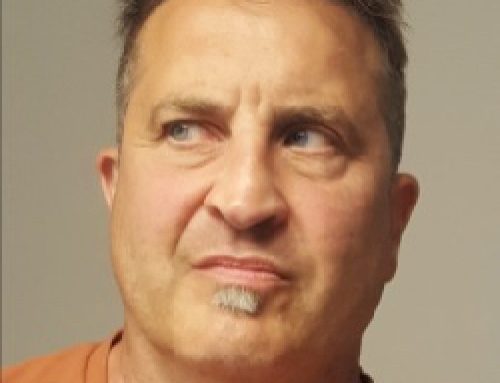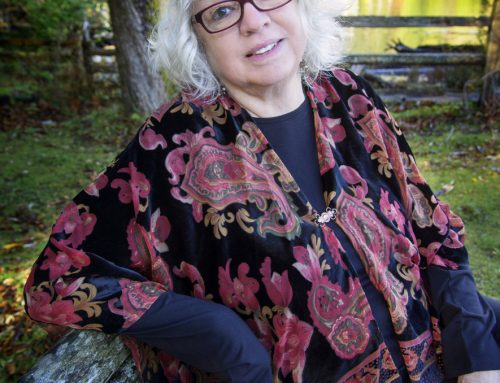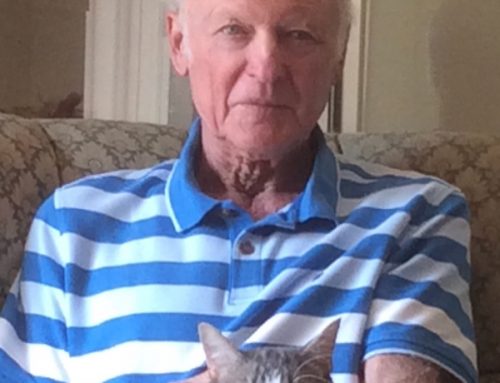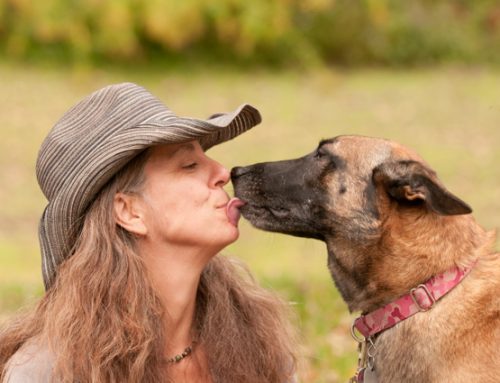This was years before the fire they called the Beast burned up half the town and the money hose slowed from a gush to a trickle. Back then I drove one of those mammoth trucks that haul the raw ore out of the excavation pits. We were removing the forest in neat rectangular chunks, like date squares from a pan. Peeling away a soggy carpet of muskeg to scoop out what had been steeping here for a hundred million years, the sour black honey of time.
Everything about the operation was orderly, methodical, streamlined. If you didn’t count us, that is, the guys working the machines. The marathon shifts we pulled had us on a slow smolder all the time, as if the toxic fuel we were clawing out of the earth had leeched into our veins and was already combusting. End of the day we would peel off straight to the bar, primed to go apeshit on anyone who looked at us sideways. Weekends we’d quad out somewhere the bush hadn’t been stripped bare yet, crack open the beer, and talk crap about women. Our cold laughter growing louder as the light faded. We’d get a fire going and all around us would suddenly be night. It always gave me this strange feeling, watching the embers whirl up into the dark. Like we were at the bottom of the world’s deepest well.
Cindy changed all that. She gave me a compass, and a direction. When we met she was waiting tables at the Bronco and we had good times together—great times—and that’s all this needed to be, we both thought. Then things started to get real between us and before long we were talking about saving up a nest egg here in the boonies and moving out to the west coast one day for the good life, maybe buying a houseboat on the island. If our little girl was an accident well she was the best one that ever happened to us. We stuck around, made our lives here in the Fort. No more drinking with my buddies in the evenings, and I didn’t miss it. Instead I was reading bedtime stories to my daughter and leaving the hall light on for her when I said goodnight.
Back then I never would have believed the three of us could be anything but together.
I was up in the truck one afternoon, climbing out of the pit with a load of ore, when the hammering started. At first I thought it was coming from somewhere on the other side of the shatterproof windows, but it was my heart banging to get out. I managed to brake before something huge pinned me to the seat so I couldn’t breathe, couldn’t see. A dark planet had rolled over ours and was crushing the light out of everything.
I was pretty much gone except for one thought. My little girl. After a while I noticed my hand moving the way it did when I stroked her hair after she’d had a bad dream. That’s what got me through. When it passed, whatever it was, I could finally answer the voice freaking out on the radio. I made up a story about the instrument panel gone whacky, warning lights blinking like a Christmas tree. They garaged the truck and ran it through every test and inspection protocol in the book. Didn’t find a thing of course. Wrong piece of equipment hooked up to the monitor.
Where had it come from, I wondered, and why had it suckerpunched me now? I’m still wondering that. I mean, things were good. My job was paying the bills and then some. A lot of then some. Cindy got her nursing degree and started work at the hospital. There was no question about what we were working our butts off for, or who. For the first time in my life I didn’t have to wonder who I was at the end of the day. I was someone’s daddy. There really isn’t anything better a man can be, is there?
I didn’t say anything to Cindy when I got home that night. I was hoping this had been some freak one-time thing, a glitch in the program, but next morning when I showed up for work the fear did too, with bells on. My knees turned to jelly before I even set a foot on the ladder up to the cab. An hour in I was sure this was death perching on my shoulder. I found Dylan Chaudiere, the shift foreman, and told him I must’ve come down with the stomach flu or something. Dylan looked at my chalky, sweating face, backed away, and ordered me the fuck home. I went, and stayed. Spent my next two shifts lying on the sofa making queasy faces whenever Cindy was looking. It must have been a convincing performance because she got after me to go see a doctor.
Something had to be done. I drove to the site the next morning and parked, but instead of heading straight in as usual I took a long slow stroll around the lot. My hands were already shaking, my walk all jerky and wrong like a marionette. A skinny guy leaning against a skyblue Camaro saw me coming his way and waved, as if he’d been waiting for me. Never met him before but I knew who he was. Some of the guys called this end of the parking lot the candy store. Easier than ordering a pizza.
“Hey,” he said. “I think I just saw a bear.”
“A bear?”
He jerked his head toward the trees at the edge of the gravel. They stood there all leafy and uninterested, like this was any other morning.
“In there, man,” he said. “In the fucking woods. Just right there.”
“What’s it doing, do you think?” I asked, squinting my eyes. I was really straining to see that bear. I needed to see it.
“Taking a shit probably,” the guy said with a shrug. “It’s what they do in the woods, right?”
I laughed but it came out sounding like I was jogging downhill.
The guy gave me this look and said, “That kind of morning, eh?”
“Yeah, that kind. Are you Jarod Sawchuk?”
“None other.”
“Okay then,” I said.
“Okay then,” he said, and popped open the trunk.
When I first came out here for work I was nineteen and had never touched anything stronger than homebrew. One thing I knew for sure was if I’d kept my wheels mostly on the pavement these last few years it was thanks to Cindy Greyeyes. No way I could ask her to carry me through this. It was up to me to stay headed the same way Cindy was going, and the white stuff did the trick, for a while. It got me up into the cab for starters, got me through the day. Then it really hooked its claws into me. I would feel my scalp peel back so that all cold starry space came rushing in and I’d ride that haul truck down into the pit like a comet, lit up and blazing. For a little while nothing could touch me.
Sometimes I think it was the sheer scale of things that had gotten to me. The magnitude of what we were doing to the earth. Digging up the past and turning it into fuel, burning through millions of years to light our cities for a day. This isn’t real, I used to say to myself some days up in the cab. This can’t be real. Like a boy playing with matches who looks up and sees he’s started the whole forest on fire, maybe it was too much for the mind to take in. And then there was the way everything around you—the robot-monster excavators, the tires of your truck, the pit like a drained lakebed—made you small. Even the eye-popping bottom line on your paycheque could do that sometimes. There was no way a number that big could have anything to do with you.
I found out how small a man could become the day Cindy asked me to pick up the unicorn princess cake she’d ordered for our daughter’s fifth birthday. I showed up late with no cake and not much recall about what I’d actually been doing with my time. This wasn’t the first occasion. There were much bigger gaps coming in the years ahead but I didn’t know that yet.
“I need you to explain it to me, Trev,” Cindy said in the kitchen after we had the party with a stale grocery-store cake that she’d rushed out to buy. Our daughter was playing with her new toys in the other room. “I mean, why?”
That was the billion dollar question. I got a beer out of the fridge and a glass out of the cupboard. Cracked the beer and slowly poured it into the glass, judging the angle with a careful eye. Every movement slow and methodical while inside me the brakes had failed and the vehicle was taking a blind corner on two wheels.
Cindy touched a hand to her chest. “We’re right here, Trev. Right here. Where are you?”
I set down the bottle and then the glass. Rested my hands flat on the counter.
“Just tell me,” Cindy said, shaking her head. “Where are you?”
“Boo!” I roared in her face all of a sudden. I didn’t know I was going to do that. I think I even laughed.
“Fuck you,” Cindy said, and shoved me. Like I was back in my bar days I didn’t think, just shoved back, harder. She swore at me again, came at me. I must have hit her then because there she was, on the floor.
She picked herself up and went into the other room with her hand on her face. I heard her say “Hey, honey” in a kind of choked little voice to our daughter. I stood there leaning against the kitchen counter slowly sipping my beer like nothing had changed. Like the world hadn’t just ended.
Cindy used to tell me about the shit she put up with back when she worked at the Bronco. She wasn’t putting up with this. Next day after I got home from work they were packed up and gone.
They’re still living in the Fort and doing okay. I’m back in St John’s but I see my daughter a few times a year when I go out to visit. It’s good. We’ve been talking about having her stay with me for a while, when she’s ready. Cindy’s coming around to the idea, I think. These days I drive a restaurant supply truck around town and after those behemoths it’s like sitting in a kid’s red wagon. They hem me in, these narrow rainy streets, but in a good way. I like feeling every pothole bounce the stacked poker chips of my backbone. It calms me. It means I’m close to the ground.
I wonder how many people can name their best day ever without needing to see how the rest turn out. Mine is easy. I came home from work that evening and told Cindy I was taking her out somewhere special. She wanted to know where but I said it was a secret. Our little girl had just turned two. We got a babysitter, and I drove us north out of town, to one of the new excavation sites. An old drinking buddy of mine working evening shift on security let us through. We parked near the edge of the pit and climbed out of the car.
“What are we doing here?” Cindy asked with that crooked smile of hers I’d fallen for, the smile that said she was game for pretty much anything.
The sky was on fire with a boreal sunset. The pit looked like the black hole that night was coming from—the night of all the time before we were here and all the time to come after we were gone. Our lives brief flashes in the dark. I set up a folding table with a tablecloth and put out a candle, a bottle of wine and two glasses. Queued up some slow tunes on the portable music player and pressed play. Then I took Cindy’s hand in mine, slid my arm around her waist, and on the edge of that dark lake, for a little while, we danced.
August 2018

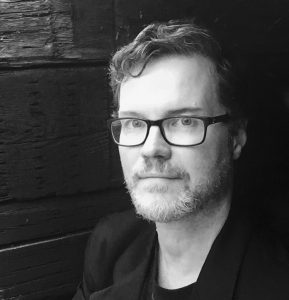 Thomas Wharton’s first novel, Icefields, received the 1996 Commonwealth Writers’ Prize for Best First Book in Canada and the Caribbean. His collection of stories, The Logogryph, was shortlisted for the International Dublin Literary Award. He lives near Edmonton and teaches creative writing at the University of Alberta.
Thomas Wharton’s first novel, Icefields, received the 1996 Commonwealth Writers’ Prize for Best First Book in Canada and the Caribbean. His collection of stories, The Logogryph, was shortlisted for the International Dublin Literary Award. He lives near Edmonton and teaches creative writing at the University of Alberta.